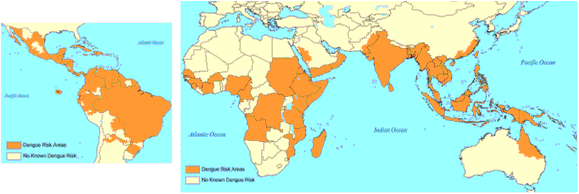# 5932

Global Spread of Dengue
Dengue is a rapidly expanding mosquito-borne virus that is estimated to infect around 50 million people every year. Tens of thousands die annually, and as yet, there is no effective vaccine.
The explosive growth of Dengue around the world is well illustrated by the following graph from the World Health Organization.

What this graph doesn’t indicate is another doubling of dengue cases has taken place over the past 5 years
Nearly a year ago I wrote about the controversial release of genetically modified mosquitoes (see The Cayman Island Mosquito Trials) by the Oxitec company in a bid to learn how to reduce these Dengue vectors.
Oxitec’s genetically altered terminator mosquitoes have been bio-engineered to carry a lethal gene that the males can pass on to their progeny that causes them to die in the larval stage.
And the early results were very promising.
An 80% reduction of mosquitoes in a 25 acre test area after 19,000 males mosquitoes were released over a 4-week period in 2010.
Since this research was conducted quietly, with little publicity, some public concern has since risen. The Cayman Island government produced this short video explaining the process in an attempt to allay any fears.
Oxitec has a short FAQ page on their technology, which you can access here.
This research was published yesterday in the Nature Biotechnology journal.
Field performance of engineered male mosquitoes
Angela F Harris, Derric Nimmo, Andrew R McKemey,Nick Kelly, Sarah Scaife, Christl A Donnelly, Camilla Beech, William D Petrie & Luke Alphey
Yesterday the New York Times and The BBC both carried extensive stories on this research. Of the two, the NYT’s article adopted a bit more of a cautionary tone.
Concerns Are Raised About Genetically Engineered Mosquitoes
By ANDREW POLLACK
Published: October 30, 2011
While the BBC article simply states that the World Health Organization is `cognizant that genetic engineering is a technology that carries the potential for risks as well as benefits’, and is working on guidelines.
GM mosquitoes show fever promise
By Richard Black 30 October 2011
Both articles provide useful background.
Oxitec’s GM process isn’t the only bid to modify mosquitoes to reduce disease transmission.
Earlier this year in A Mosquito STD To Fight Dengue I wrote about a project to infect mosquitoes with Wolbachia, a bacteria commonly found in fruit flies that – for reasons that aren’t entirely clear - inhibits a mosquito’s ability to transmit Dengue Fever.
Around the beginning of the year scientists in Queensland, Australia began releasing thousands of Wolbachia infected mosquitoes each week into the remote communities of Gordonvale and Yorkeys Knob.
The hope being that infected mosquitoes would eventually supplant the uninfected native mosquito population. Helping this project along is the way that Wolbachia is transmitted among mosquitoes.
You see . . . among mosquitoes, Wolbachia is essentially an STD, a sexually transmitted disease.
The bottom line: Within a matter of a few months the Wolbachia infected mosquitoes overran the uninfected mosquito population in these two test environments.
While extremely encouraging, more tests are needed, including confirmation that this process works against all dengue serotypes. The Gates Foundation is providing further funding to support the release of Wolbachia mosquitoes in Australia, Vietnam and Thailand.
While there are safety issues that must be addressed - and getting the public to accept genetically modified mozzies may be an issue - the creation of a Brave New Mosquito may someday contribute to the reduction of Dengue, Malaria, and other mosquito-borne diseases around the world.
At least, that’s the hope.
Related Post:
Widget by [ Iptek-4u ]
